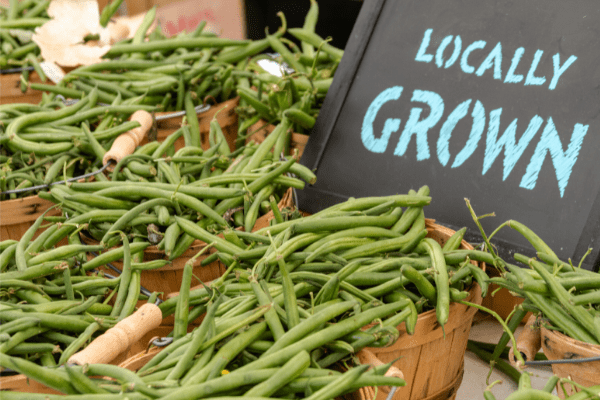We’ve been talking a lot about food hubs lately. These vital organizations—sometimes structured as nonprofits, sometimes as for-profits and sometimes as a blend—build up regional food ecosystems. By aggregating, distributing and marketing local goods to consumers, restaurants, retailers, distributors and institutional customers, food hubs broaden small producers’ sales opportunities beyond what they could access on their own. At the same time, they connect eaters with local food they may not have found on their own.
Food hub work is meaningful work, which is what draws many food and farm entrepreneurs to it. This is also what has led these entities to gain more attention in recent years—and especially since COVID-19 ransacked food supply chains and inspired greater interest in eating locally. However, as we’ve discussed before, food hubs can be challenging endeavors to make work financially.
That’s why we were delighted to feature one that has found sustained success and scaled significantly in the latest Edible-Alpha® podcast. Launched in 2004, Farm Fresh Rhode Island is a nationally recognized food hub with broad reach, offering a patchwork of programs that strengthen the regional food infrastructure. From Tera’s discussion with co-executive director Jesse Rye, we learned how this organization, which both generates revenue and receives public and philanthropic support, has pulled it all off and continues to grow.
Farm Fresh Rhode Island’s story reveals a wealth of insights into making food hubs succeed, which others doing this type of work will find valuable. But the cool thing is these lessons aren’t limited just to food hubs—they can help any food or farm entrepreneur trying to build a financially viable business. Here are three big ones:
1. Coordination and collaboration can create critical mass.
One of the most impressive aspects of Farm Fresh Road Island is its breadth of programming. As Tera notes in the podcast, many organizations have just a mobile market or just a mission-driven culinary training program. These outfits are usually small and underfunded, making it tough to stay afloat or really move the needle. But when the services are woven together, they can play off of and help sustain one another to make a bigger impact.
But beyond its internal integration, Farm Fresh also coordinates and collaborates with other values-aligned businesses to create a greater whole. The organization rents space in its new facility to food and farm businesses needing a step-up space for their next growth phase. The end product is a critical mass of entrepreneurship and commerce that attracts local consumers and scores local producers more exposure.
Food hubs and other food and farm businesses can emulate this strategy in many different ways, such as by teaming up with other companies on e-commerce and delivery, or by organizing a community market or event that draws a crowd.
2. Securing money from myriad sources can pay off big.
People often ask Tera where she got the money for teraswhey, and she’ll say “from everyone!” This has been Farm Fresh’s strategy too, especially when trying to secure funds for its ambitious facility-development project. As Jesse says in the podcast, “we left no stone unturned.” The team talked to a wide range of investors, foundations, government agencies and stakeholders about its goals, hoping to secure support. In the end, Farm Fresh got funding from multiple government agencies, impact investors and foundations, including some that didn’t typically invest in food or ag. Jesse says getting private funding helped sew up public dollars and vice versa.
The lesson here is that you just never know where money could come from, and it can be helpful to court a range of sources. That doesn’t mean taking just any money offered, regardless of strings attached. But consider widening the net beyond the obvious sources.
3. Business basics and financial savvy are essential for fostering growth.
You’ve heard us say these things over and over, but they can’t be said enough: It’s a business model, not a product, that determines financial viability, and entrepreneurs need to understand their business’s financial health to stay in business and scale.
Farm Fresh Rhode Island’s growth hasn’t happened by accident or luck or because its services are just so awesome. Led by Jesse’s efforts, the food hub implemented strong systems and support structures to manage its financial picture, operate smoothly and facilitate growth. Developing financial savvy and other business skills are critical to the survival and success of any food or farm business – and is just what our Financial Management Boot Camp is designed to do.

Farm Fresh Rhode Island started humbly 17 years ago and has grown into a multifaceted food hub that’s bolstering the regional food ecosystem of New England. Co-executive director Jesse Rye shares the organization’s history and growth trajectory and explains how it accomplishes so much, from its smart fundraising to its pandemic pivot, providing ample insights for food hub operators and food and ag business owners alike.
And now, our roundup of the best food and beverage finance news, events and resources from around the web…
Business Model Insights
- Ready for the ‘Great Reset’? How digital transformation can future-proof food manufacturing (Food Dive)
Implementing digital technology at a plant can improve efficiency, productivity and finished-product quality. But is that enough to ensure success in a marketplace still impacted by COVID-19? - From Farm to Doorstep: The Rise of Digital Farmers Markets (Food Tank)
- The latest generation marketers are courting? Gen Alpha (and their millennial parents) (The Food Institute)
Raising Capital
- The investor’s lens (The Intertwine Group)
To convince investors, think through your ask and what your business would look like if it had the capital it needed. How would you deploy the funds and what results would they bring? - 7 Ways to Preclude the Most Common Investor Rejection (Startup Professionals Musings)
- Why Millennials and Generation Z Love Impact Investing (Entrepreneur)
CPG/National Brands
- Brand loyalty is eroding under supply chain and price pressures, survey finds (Food Dive)
Eight out of 10 consumers bought a different brand usual over the past three months, with more than 65% influenced by substitute brands’ lower prices and 51% motivated by out-of-stocks. - Few of the top 50 food companies disclose Scope 3 emissions (New Hope Network)
- The Supply Chain Is in Crisis. How Do We Move Forward? (Forbes)

Market Trends
- Survey: Convenience drives online grocery shopping more than COVID (Supermarket News)
According to a new poll of more than 2,300 U.S. consumers, 76% buy groceries online for ease and convenience while just 56% do so because of COVID-19-related concerns. - Higher food prices, lower inventory expected through holidays (The Food Institute)
- Values, sourcing and convenience still paint the trend picture at Natural Products Expo East 2021 (New Hope Network)

Farming and AgTech
- Agriculture Reporter Sarah Mock Is Challenging the Narrative About Small Family Farms (Civil Eats)
The self-confessed ag policy wonk argues that today’s small farm isn’t a working model and is drafting a blueprint for a more sustainable system she calls “Big Team Farm.” - How Has Hurricane Ida Affected Agriculture and Food? (Modern Farmer)
- What does never-ending drought mean for California agriculture? (GreenBiz)
Deals/M&A
- Nitrogen fixer Andes scores $15m from Bayer, Wilbur-Ellis to move into carbon capture (AgFunder News)
Andes’s seed-treatment technology aims to reduce reliance on synthetic fertilizers by combining seeds with microbes that colonize a crop’s root structure as it grows and enhance its natural nitrogen-fixing capabilities.
Cargill & AeroFarms talk indoor cocoa production (AgFunder News)
Diverse investor base behind $3.8 m fundraise will help Asian American food startup immi go mainstream (FoodNavigator-USA)

Industry Events
Virtual events:
- FoodNavigator Climate Smart Food Digital Summit: 9/27–9/30
- Edible-Alpha® Immersion Training: Building a Brand that Stands Out with Katie Mleziva: 9/28–9/30
- FFI Webinar: So You Won a VAPG, Now What?: 10/4
- Food and Beverage 2021 Global Symposium: 10/5
- Food Safety Consortium Virtual Conference Series: Thursdays 10/7–11/4
- Biophilic Leadership Summit: 10/10–10/11
- National Organic Standards Board Fall Meeting: 10/13–10/21
- Food & Nutrition Conference & Expo: 10/16–10/19
- Edible-Alpha® Immersion Training: Raising Equity: 10/18–10/22
- FFI Webinar: Enhancing Farm Revenue with Conservation Practices and Ecosystem Services: 10/26
- American Food Manufacturing Summit: 11/16–11/18
In-person events:
- Natural Products Expo East: 9/22–9/25 in Philadelphia, PA
- Fancy Food Show 2021: 9/27–9/29 in New York, NY
- World Dairy Expo: 9/28–10/2 in Madison, WI
- Northeast Organic Dairy Producers Alliance Field Days: 9/30–10/1 in Freeport, ME
- Land Stewardship Project Just Food & Farm System Harvest Festival: 10/2 in Jordan, MN
- SupplySide West/Food ingredients North America: 10/25–10/28 in Las Vegas, NV
- Soil Health Academy: Transitional Regenerative Dairying: 10/26–10/28 in Loganton, PA
- IBIEducate 2021: 10/26–10/28 in Kansas City, MO
- PMA Fresh Summit: 10/28–10/30 in New Orleans, LA
- Poultry Tech Summit: 10/31–11/2 in Atlanta, GA
- Process Expo: 11/2–11/5 in Chicago, IL
- Digital Food & Beverage: 11/10–11/12 in Austin, TX
- Sustainable Agriculture Conference: 11/13–11/15 in Durham, NC
- PLMA Private Label Trade Show: 11/14–11/16 in Chicago, IL
- Food as Medicine Summit: Bay Area: 11/17–11/18 in San Mateo, CA
- Iowa Organic Conference: 11/28–11/29
- NOSH Live Winter: 11/30–12/1 in Santa Monica, CA
- Midwest Food Products Association 2021 Annual Convention & Processing Crops Conference: 11/30–12/2 in Wisconsin Dells, WI
- Organic Grower Summit: 12/1–12/2 in Monterey, CA
- BevNET Live Winter 2021: 12/6–12/7 in Santa Monica, CA




